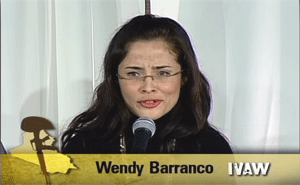Winter Soldier
by Iraq Veterans Against the War
2008
Hi. Good morning. Thank you all for being here. I'd like to thank Lisa Kent and Jen Hogg without whom I would not be on this panel. And thank you all for being here.
I'd like to tell you a little bit about myself. I trained as a combat medic. I joined straight out of high school. I was 17. My first experience with sexual harassment was with my recruiter. He was married and his wife was pregnant. And he used to make it a requirement for me to go with him and talk to other soldiers about joining the Army and kind of like reeling them in, you know. So that was one thing. And one night he got drunk. And he had to stay at a hotel because his wife was mad at him or something. And he had me drive him to the hotel. And at the hotel he came on to me and I was able to weasel my way out of it and get out. That was my first brush with the military and sexual harassment.
When I was in Basic, [inaudible] were known to sleep with the trainees. I did not personally witness it, or was it on me, but they were known.
When I deployed, I was in a clinic. I worked sick call. I was a combat medic. And so I had this interest for working, for looking for gruesome things, because I wanted to see the good stuff. And I asked one of the surgeons who was there. I said, "Hey, is there a way I can go to the operating room and watch a case?" And he said, "Okay." The next day he came and he's like, "Do you want to start working there?" And I'm like, "Yeah, sure."
I started the next day at 7 o'clock in the morning. And through that whole deployment, I was harassed like every single day. I dreaded every day I went to work. Because this person would catch me alone or in a hallway alone and push himself against me with his hands behind his back. And I can tell you it's extremely difficult to do your job proficiently, efficiently and correctly when there's someone you have to look out for, your own people, your own comrades, your own supervisors.
So basically what he was practicing was quid pro quo: "I transferred you to the operating room, so therefore you need to give me something back." It never got to a physical point, because he knew exactly what he was doing and I never reported it, because I knew Command wasn't going to do anything about it. So there was no point.
This person was a person who was in a very extremely important position. And he had transferred me over and all I kept thinking about was, "If I speak out, it's going to be my word against him. And I'm just an E-4. I'm a Specialist. So who are they going to believe? Are they going to get rid of the guy who is making all of the decisions and saving lives, or me, the disposable Specialist?"

And a lot of people say, "Well, why didn't you report it? It's so easy." No. It's not. You're looked at as a snitch for turning around and talking about your brothers and sisters and comrades that you're working with day in and day out.
And some people point out also that there's training. That we do sexual harassment training. We do Consideration of Others training. But the type of training that goes on is "Check the box" training. "Here's a list, go ahead and sign it, and there's an NCO at the front of the room with a power point presentation, slide, slide, slide, slide, slide; we're done! Everybody go home." That's pretty much it, what it comes down to.
It's really hard for me to sit here and tell you all this, because I haven't really --
I joined to be patriotic, and I joined to try and do something for my country, and I joined [voice breaking] Crap! I hate to be the girl. I joined to try and do something for my country and trying to be patriotic, and the last thing I would have imagined would have been joining an organization where by my own peers, by my own comrades, I would have been harassed in that way. Thank you very much.
